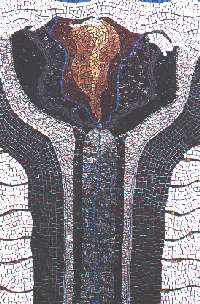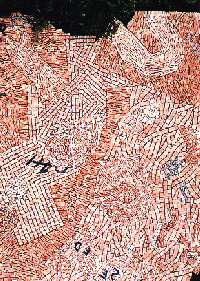
 |

THE FIFTH A.I.M.C. BIENNIAL CONFERENCE AND EXHIBITION
|
|
|
| Elaine M. Goodwin - Gift of the Nile |
In organising the conference Dr. Salem was assisted by an enthusiastic and delightful team of students from the Faculty of Fine Arts at the University and the associated Atelier d'Alexandrie. The various sessions were held in Alexandria's new International Congress Hall, and the exhibition was displayed in the galleries of the Atelier. Other activities included visits to see, among other things, the beautiful mosaics in the city's fine Graeco-Roman museum, Pompey's Pillar and the Catacombs. A visit to the site of Alexander the Great's Pharos was an excitement, since the huge lighthouse was a tremendous wonder in its day, and some of the great dressed stones can still be seen on the sea bed, lying where they fell. Of great interest too was the site of the new Biblioteca Alexandria, located next to the conference hall. A magnificent cultural and architectural project, designed by Snohetta A.S. (a Norwegian firm), the new "Great Library of Alexandria" is expected to open in time to celebrate the beginning of the city's next millennium.
The theme of the conference was Mosaic Past, Mosaic Present, and a number of delegates gave illustrated presentations. Elaine M. Goodwin, who was the only delegate from the UK, spoke at the opening session on the subject of "British Mosaic, Past and Present", referring to the Roman period and England's oldest mosaic (which is in Exeter Museum), and tracing the renewed interest in mosaic from the 19th and early 20th centuries as a decorative and functional medium, to mosaic's evolution later in the present century into a fine art medium in its own right. Other lecture topics of particular interest included the presentation given by Freda Jardim and her group (Brazil) on their city work in Vittoria, while Marzia de Lorenzi (Italy) spoke on an intriguing project to reconstruct the Alexandria Lighthouse through a model, involving the collaboration of an architect, a ceramicist and a mosaicist. Fernanda Tollemeto (Italy) discussed the importance of the concentration of light and transparency in her current work; Marco Bravura (Italy) described a project in the village of Montefeltro, and how his mosaic "snail fountain", an example of mosaic as sculpture, was integrated into the whole architectural context. Verdiano Marzi (San Marino) spoke about working with mosaic in India, and especially at Dharamsala.
The accompanying Exhibition, which included some 60 pieces submitted by the participants, covered a wide spectrum of styles and techniques and, as Mr Farouk Hosny, the Egyptian Minister of Culture, remarked in his introduction to the handsome catalogue, it offered a chance "to see the art of mosaic from a different perspective... as a medium of expression that goes far beyond the decorative function to which it has long been confined". Jane Muir, a founder member of the AIMC, exhibited a mosaic entitled Talisman. Elaine Goodwin showed a much-admired mosaic called Gift of the Nile (see photo), which was specially created for the exhibition, and used gold and silver smalti, marble, granite and vitreous glass. Elaine has generously donated her piece to the Biblioteca Alexandrina, where it will be permanently displayed.
|
|
| Mural Mosaic by Toyo Harukii (Japan) |
Gamal Hosny and Magdy Tantawi, two young mosaic artists from Alexandria, showed interesting pieces: strong, subtle and with an instinctive understanding of the medium. The quality of the work of some of the younger artists was encouraging. Among the many other pieces which impressed were those by Almuth Sch"ps (Italy), Marco Bravura (Italy), Mohammed Salem (Egypt), Catherine Mandron (France), Fabrico Amargo (France), Haruya Kudo (Japan - the previous conference president), Fernanda Tollemeto (Italy), and Milun Garcevic (Croatia). The piece by Helle Sharling (Denmark) made a striking conference poster.
The Egyptian press and television gave considerable coverage both locally and nationally to the official opening of the conference and to the formal inauguration of the exhibition, which was open to the public and attracted a considerable number of viewers. Following the closing session of the conference in Alexandria on 16 October, most of the participants returned to Cairo for a short programme of visits to the Giza and Saqqara pyramid complexes, and to the site of the ancient city of Memphis, before dispersing. It was generally agreed that it had been a thoroughly enjoyable and well-organised conference (the local company charged with the vexatious task of rounding up the participants and transporting them to various venues and events managed not to lose anybody). As was inevitably the case, it was also quite strenuous, since there was a lot of news to catch up on from other countries, and a tremendous amount of mosaic talk went on nightly until the very small hours.
The two-year gap between conferences means that links often become tenuous, and many of the mosaicists who were at Alexandria expressed interest in establishing some more regular form of communication. This has prompted the idea that our very own Mosaic Matters newsletter and information service might usefully take on an international dimension, as a way of exchanging views and maintaining contacts on a wider basis.
The next AIMC conference will be held in 1998, although the venue has not yet been finally established. The Secretary of the Associazone Internazionale Mosaicisti Contemporanei is Signora Patrizia Poggi, at Via Roma 130, 48100 Ravenna, Italy.
(Grateful thanks to Lindy Ayubi for contributing this account - Editor)
All
content is copyright of © Mosaic Matters and its contributors.
All rights reserved
Mosaic
Matters is:
Editor: Paul Bentley
Web Manager/Designer: Andy Mitchell


